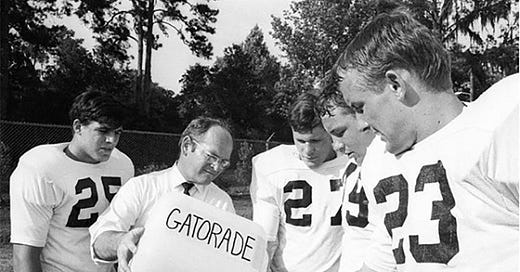From A University Lab To The World: The Gatorade Story...
This week’s newsletter is on how four University scientists created a whole new industry and one of the world’s most famous sports drinks, Gatorade...
Happy new week!
Gatorade was founded more than 50 years ago at the University of Florida. Back in the day, American football players weren't allowed to drink water during practice or games. Coaches thought water made players slow and sluggish, so outside of the occasional salt tablet and a gulp of water, no hydration was allowed.
The players complained so much about dehydration that the assistant football coach went over to the science labs to determine why many of Florida's players were so negatively affected by the heat. Dr. James Robert Cade and his team of researchers; Doctors H. James Free, Dana Shires, and Alex de Quesada created a drink to replace bodily fluids lost during physical exertion, the now global sports drink which kickstarted a whole industry, Gatorade.
In its early days, Gatorade wasn't a hit with players. The drink reportedly tasted so awful that some athletes vomited after consuming it. Even none of the scientists could stomach it. The scientists played with the formula, adding lemon, orange, and a non-nutritive sweetener, and at last, Gatorade was drinkable. Not tasty, but drinkable. The impact of Gatorade was clear as day, over the next five years, only one player had to be hospitalized for treatment of a heat-related illness. Turns out, he had not drunk any Gatorade.

In 1967, one of Cade’s research fellows took a job at Indiana University, where he told a vice president for Indianapolis-based beverage company, Stokely-Van Camp Co. about Gatorade. A couple of months later, Stokely-Van Camp had secured rights from Cade and his fellow inventors to begin marketing Gatorade nationwide. Shortly after, Stokely-Van Camp was selling hundreds of thousands of gallons of Gatorade annually and interest in ownership rights grew.
The next few years were marked by a series of legal disputes that were ultimately settled in 1973 so that both the University of Florida and the original inventors, the Gatorade Trust, could receive royalties. In 1983, the Quaker Oats Co. purchased Stokely-Van Camp and, as University of Florida marketing Professor Richard Lutz describes it, “launched Gatorade from a sleepy little brand into superstardom.”
The Quaker Oats Co. was able to draw on its vast marketing resources and utilise the talents of the world’s most famous athlete, Michael Jordan. Quaker Oats was able to own more than 80% of the sports beverage market for Gatorade. Since 1983, Gatorade has seen an unprecedented 20 percent annual sales growth rate, from about $100 million in 1983 to more than $2.2 billion in 2001. Pepsico purchased Quaker Oats in 2001.
Initially Cade wanted to sell the name and the product for $1 million but Stokely-Van Camp was concerned about paying so much upfront. They decided to agree on a price and a royalty fee they would receive in perpetuity. This was definitely a better deal for Cade and his team. Once again playing the long game always pays more.
"The perpetual royalty turned out very well for us, as 35 years later we still get a royalty payment every other month which is several times larger than the $1 million we had asked." Dr. James Robert Cade.
Gatorade now has a range of product offerings designed to meet the needs of athletes at all competitive levels and across an array of sports. They use the same name for all its products which is known as a family branding strategy also known as umbrella branding. This is a marketing strategy that is used to create brand recognition and loyalty among consumers.
By using the same name for all its products, Gatorade is able to create a strong brand identity and leverage the success of one product to help promote other products in the same product class. This strategy can also help reduce marketing costs, as the firm only needs to promote one brand name instead of multiple individual product names.
To think that all this started with four university scientists solving a problem for their university football team!
Something interesting to watch
Something interesting to listen to - I spoke about my career journey on the Breakout Sports podcast, give it a listen!


